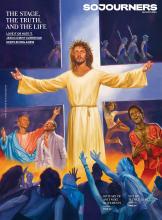Wesley Granberg-Michaelson’s advice to Christian leaders: Discern God’s call and learn how to sustain your inward life for the long term.
“Leaders have to know who they are,” he said.
“When everything else crumbles and when you are in situations of disillusionment, when plans haven’t worked out, when colleagues have disappointed you, there’ll come those times when you say, ‘Why am I doing this?’
“At that point, what is needed is a deep and abiding sense of God’s call.”
Granberg-Michaelson’s call led him to take on a variety of roles in his career. He served from 1994 to 2010 as general secretary of the Reformed Church in America. He is the author of several books, including “Leadership from Inside Out: Spirituality and Organizational Change.”
Before that, he served as research assistant for U.S. Sen. Mark Hatfield, managing editor of Sojourners magazine, co-founder of a nonprofit organization, and director of church and society for the World Council of Churches.
Q: You’ve had a really interesting career, including working on Capitol Hill and in Geneva, Switzerland with the World Council of Churches. What did you learn from those roles?
Working in the U.S. Senate with Mark Hatfield is when I first learned about how important it was to have a group that had a deep level of trust together. And that you have to work on building that.
And then in the life of Mark Hatfield as a U.S. senator, I saw the importance of giving voice to crucial issues in ways that helped empower others. The role of prophetic ministry I really witnessed in his life in the U.S. Senate, the kinds of stances that he took against the Vietnam War, stances that were rooted in his own convictions.
Those were qualities that came out of his Christian character. But those were also qualities I saw and learned in that secular context.
When I went to Geneva with the World Council, I got to see the enormous complexities of how organizations function and how decisions are made. I was very involved in a restructuring effort.
We spent a lot of time figuring out models for how church bodies can govern themselves. And the World Council was in a deep discussion — conflict, really — with its Orthodox members at that point. I was involved in a special commission on relations with the Orthodox.
One of the key issues was how we make decisions. To the Orthodox mind, it was incomprehensible that a central committee of 150 people could meet together and by a majority vote determine God’s will.
That led to a whole fascinating journey that I’ve continued on ever since, to rethink how church bodies make decisions.
Out of that dialogue came an embracing of models of consensus decision making, which the World Council still uses today, where 150 people will come to a decision that they arrive at by consensus. It’s a discussion, a deliberation that’s led very carefully, very artfully, taking into account the opposing points of view and getting to a point where either the body as a whole agrees or a minority that may not agree are willing to say, “We will step aside and allow this to go forward.” Or convictions are held so strongly that the body as a whole decides it’s really not ready to decide this.
None of these functions by majority vote. It’s a very different model, and I think one that’s much more attuned to how the church could make decisions.
Read the Full Article



